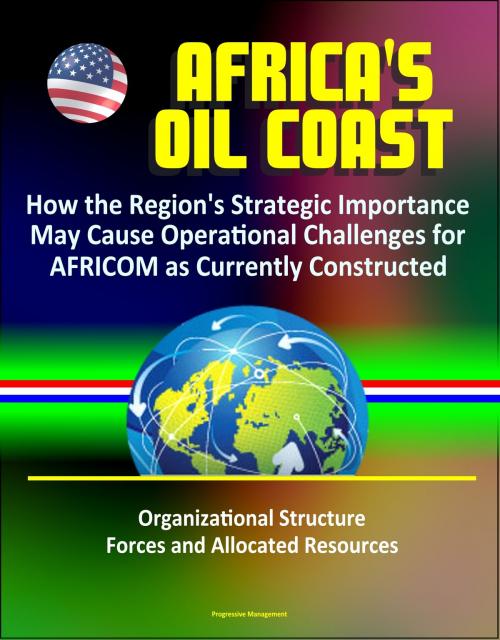Africa's Oil Coast: How the Region's Strategic Importance May Cause Operational Challenges for AFRICOM as Currently Constructed - Organizational Structure, Forces and Allocated Resources
Nonfiction, History, Africa, South Africa, Military, United States| Author: | Progressive Management | ISBN: | 9781310476181 |
| Publisher: | Progressive Management | Publication: | April 12, 2016 |
| Imprint: | Smashwords Edition | Language: | English |
| Author: | Progressive Management |
| ISBN: | 9781310476181 |
| Publisher: | Progressive Management |
| Publication: | April 12, 2016 |
| Imprint: | Smashwords Edition |
| Language: | English |
This excellent report has been professionally converted for accurate flowing-text e-book format reproduction. The U.S. Africa Command (AFRICOM) is at a critical crossroads regarding the trajectory of its organizational design and operational approach. As problems in Africa continue to escalate and present additional threats to U.S. national security, the combatant command faces issues it is not equipped or organizationally structured to negotiate. Since AFRICOM's formation in 2007, the organization has encountered several challenges due to its limited resourcing, manning, and operational reach. AFRICOM cannot be everywhere on the continent; therefore, the command must prioritize its efforts to improve African security and maximize organizational effectiveness. Senior U.S. policy makers and Department of Defense (DOD) officials should consider re-framing the African operational environment and generate options that more effectively employ military means to foster continental stability and achieve American strategic objectives.
One prospective approach is to place more emphasis and resources towards stabilizing Africa's Oil Coast. Violent extremism, illicit drug trafficking, and lucrative oil resources represent interdependent subjects that are manifesting instability throughout the Oil Coast. These emerging transnational threats jeopardize long-term African security, endangering prosperity throughout the international system. Therefore, a plausible option for U.S. policy makers and DOD officials to consider is making the region AFRICOM's decisive operation. Through increased resourcing and structural adaption, this approach may increase AFRICOM's operational efficiency and more effectively facilitate the commands linkage of tactical actions to strategic ends across both time and space.
CHAPTER 1 * INTRODUCTION * Background of the Study * Statement of the Problem * Purpose of the Study * Significance of the Study * Theoretical Framework * Research Questions * Limitations * Assumptions * Organization of the Study * CHAPTER II * Literature review * Introduction * Organizational Theory * Literature Review Summary * CHAPTER III * METHODOLOGY * Data Collection * Data Analysis * CHAPTER IV * DATA ANALYSIS * Why Africa's Oil Coast? * AFRICOM CASE STUDY * Overview * AFRICOM's Organizational Structure * AFRICOM's Forces and Allocated Resources * AFRICOM's Organizational Effectiveness * CHAPTER V * CONCLUSION AND RECOMMENDATIONS * Conclusion * Recommendations * BIBLIOGRAPHY * FOOTNOTES
This excellent report has been professionally converted for accurate flowing-text e-book format reproduction. The U.S. Africa Command (AFRICOM) is at a critical crossroads regarding the trajectory of its organizational design and operational approach. As problems in Africa continue to escalate and present additional threats to U.S. national security, the combatant command faces issues it is not equipped or organizationally structured to negotiate. Since AFRICOM's formation in 2007, the organization has encountered several challenges due to its limited resourcing, manning, and operational reach. AFRICOM cannot be everywhere on the continent; therefore, the command must prioritize its efforts to improve African security and maximize organizational effectiveness. Senior U.S. policy makers and Department of Defense (DOD) officials should consider re-framing the African operational environment and generate options that more effectively employ military means to foster continental stability and achieve American strategic objectives.
One prospective approach is to place more emphasis and resources towards stabilizing Africa's Oil Coast. Violent extremism, illicit drug trafficking, and lucrative oil resources represent interdependent subjects that are manifesting instability throughout the Oil Coast. These emerging transnational threats jeopardize long-term African security, endangering prosperity throughout the international system. Therefore, a plausible option for U.S. policy makers and DOD officials to consider is making the region AFRICOM's decisive operation. Through increased resourcing and structural adaption, this approach may increase AFRICOM's operational efficiency and more effectively facilitate the commands linkage of tactical actions to strategic ends across both time and space.
CHAPTER 1 * INTRODUCTION * Background of the Study * Statement of the Problem * Purpose of the Study * Significance of the Study * Theoretical Framework * Research Questions * Limitations * Assumptions * Organization of the Study * CHAPTER II * Literature review * Introduction * Organizational Theory * Literature Review Summary * CHAPTER III * METHODOLOGY * Data Collection * Data Analysis * CHAPTER IV * DATA ANALYSIS * Why Africa's Oil Coast? * AFRICOM CASE STUDY * Overview * AFRICOM's Organizational Structure * AFRICOM's Forces and Allocated Resources * AFRICOM's Organizational Effectiveness * CHAPTER V * CONCLUSION AND RECOMMENDATIONS * Conclusion * Recommendations * BIBLIOGRAPHY * FOOTNOTES















